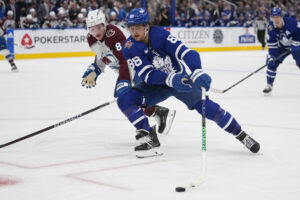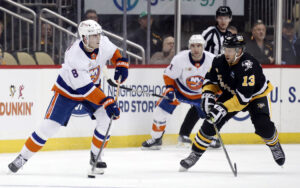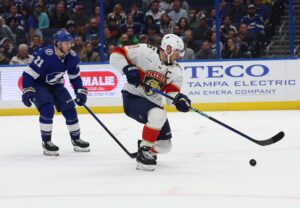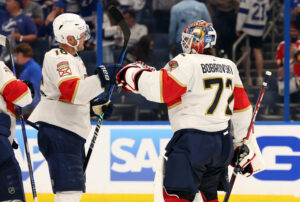The Montreal Canadiens are the most storied franchise in NHL history. With the most Stanley Cups (24) and most finals appearances (34), there are a plethora of great Canadiens teams in their history. Still, it’s not hard to see that in the past 30 years, the Canadiens have not been able to replicate their rich history. There have been blips and flashes, but nothing really substantial. Looking back, the 1989 Montreal Canadiens was the last great Habs team.
1989 Montreal Canadiens: The Last Great Habs Team
First off, if you know your Habs history, you know this team did NOT win the Stanley Cup (more on that later). It doesn’t change the fact that the ’89 Habs were a fantastic team. The only reason they aren’t talked about more is the fact they did not hoist Lord Stanley’s mug at the end of the playoffs. While there are many that argue a team cannot be great unless they win the championship, I disagree. Are the 1995-96 Detroit Red Wings or 2007 New England Patriots awful teams because they couldn’t win a championship? I argue no they are not. They came up short for sure but that’s the beauty of sport, sometimes a great team gets upset.
So this is how we land on the 1988-89 Montreal Canadiens. A great team, missing its ultimate prize. Let’s all take a walk down memory lane, shall we?
The Off-Season
The Habs entered the 1988 off-season in frustration. After winning the Adams Division with 103 points, the Habs were unceremoniously dumped out of the playoffs in the Adams Division final by the hated Boston Bruins, 4-1. It was the Bruins first playoff win over the Habs since 1943. Head Coach Jean Perron was fired, just three seasons after leading the Habs to their 23rd Stanley Cup in 1986. Pat Burns was hired as Perron’s replacement.
General Manager Serge Savard then traded the tragic tough guy, John Kordic to the Toronto Maple Leafs for speedy Russ Courtnall early in the season (November 7).
The Roster
Forwards
The Habs were pretty deep up front. The Habs were led by the little viking, Mats Naslund. Naslund led the team in goals (33) and points (84). He was joined on the top line with Bobby Smith and Stephane Richer. Smith was second on the team in goals (32) and points (83). Richer was coming off his first 50-goal season in 1987-88, but dealt with some injury issues and could only net 25 goals on the year. While the Habs didn’t have a true all-star forward, they had depth as seven forwards scored 20 or more goals.
The Habs also had several gritty and defensive forwards. Claude Lemieux, Shayne Corson, Guy Carbonneau, and Brian Skrudland were all key contributors on this team in all areas of the ice. The leader of the forwards and team was captain Bob Gainey. Unfortunately, injuries limited Gainey to only 49 games in what would be his final year.
Defence
The defence was led by the emerging pairing of Chris Chelios and Petr Svoboda. Chelios led the Habs in assists with 58 to go along with his 15 goals. Habs legend Larry Robinson was in his 16th season, but was still a key member of the defence in his last season with the Habs. Craig Ludwig and Rick Green were tough stay-at-home defencemen on the roster as well.
Goalies
Patrick Roy was the Habs goalie, who had a tremendous season in 1988-89. The Hall of Fame goalie sported a 33-5-6 record for the season with four shutouts. Incredibly, Roy posted a 22-0-4 record at the Forum during the season. Brian Hayward was Roy’s backup. Hayward recorded a 20-13-3 record with a 2.90 goals against average. The pair would combine to allow the fewest goals in the NHL.
The Season
New coach Pat Burns and the Habs got off to a sluggish start. The team went 4-7-1 in their first 12 games. When November started, however, something clicked. Between November 1 and January 18, the Habs went 28-4-5. Their strong play continued through the season and finished with a 53-18-9 and 115 points, an eight-win and 12-point improvement on the previous season. The Habs were runaway winners of the Adams Division, blowing past their nearest rivals, the Boston Bruins, by 27 points. Their nearest competition in the Wales Conference was the Washington Capitals, who won the Patrick Division with 92 points. The Habs were the class of the Wales Conference in 1989. The Canadiens 115 points were good for second overall in the NHL, only behind the 117 points of the Calgary Flames.
Pat Burns brought a strong defensive style to the Habs. The Canadiens allowed the fewest goals (218) in the league while scoring the fifth most (315). The Habs also were the least penalized teams and allowed the fewest power-play goals. The Habs were poised for a strong playoff run.
Playoffs
Adams Division Semi-Final
In the Adams Division semi-final, the Habs would meet the Hartford Whalers. The Habs were the overwhelming favourites entering the series. Montreal dominated the Whalers in the regular season going 7-1-0. The Whalers finished 36 points behind the Canadiens and actually had a record below .500 (37-38-5).
The Habs came out of the gates flying, knocking the Whalers off in game one 6-2. Many thought that this would be a cakewalk for the Canadiens. While the Habs did sweep the Whalers in the series, games two, three and four were all decided by one goal.
Game three was a back and forth affair. The Whalers jumped out to a 2-0 lead in the second period before the Habs cut the lead in half going into the third. The third period saw five goals scored and when the dust settled, the game was tied 4-4. The Canadiens eventually took the game in overtime to take a commanding 3-0 series lead. Game four saw the Whalers overcome a two-goal third period deficit to force overtime once more. Again, the Habs would find a way to in the extra period, this time to complete the sweep.
While the Habs did sweep an inferior opponent in this series, the Whalers did provide a stern test. Most figured the series would play out like game one, but Hartford made the Habs work for their sweep. Habs centre Bobby Smith had a great series, scoring four goals and six points.
Adams Division Final
The Canadiens would meet a familiar foe in the Adams division finals. For the sixth consecutive season (in what would be nine consecutive seasons), Montreal would face the Boston Bruins.
In the 1988 playoffs, the Bruins beat the Habs in the playoffs for the first time in 18 playoff series. The Bruins had to feel a bit more confident entering the series after getting the Montreal monkey off their back in 1988. Despite this confidence, the Habs were heavy favourites after going 7-0-1 against the Bruins in the regular season.
Like the Hartford series, the games were closer than expected, with all games being decided by one goal. Still, the Habs prevailed in five games. Burns had the Canadiens playing comfortable and confident in close games. Despite facing tighter games than expected, the Canadiens were finding ways to win – the mark of a great team.
Unfortunately for the Canadiens, this would be the last playoff victory against the Bruins until 2002.
Wales Conference Finals
In the Wales Conference finals, the Canadiens would play the Philadelphia Flyers. The Flyers were on an unlikely run to the Conference finals. Philadelphia knocked off the Patrick Division-leading Washington Capitals and the upstart (and in-state rivals) Pittsburgh Penguins on their way to meeting the Habs. This was a rematch of the 1987 Wales Conference finals, which the Flyers won 4-2.
The tone of the series was set in game one when Chris Chelios hit Flyers winger Brian Propp with a vicious elbow. Propp was knocked out on the play and missed game two with a concussion. Uncharacteristically, the Broad Street Bullies did not seek physical retaliation in the series (yet). They would win game one, at the Montreal Forum, 3-1.
The Habs then found their footing in the series, winning the next three games, a pair of 3-0 shutouts sandwiched around a 5-1 crushing to take a stranglehold on the series. After game four, at the Spectrom in Philadelphia, Flyers fans decided to throw things at the Habs players and coaches as the clock wound down.
The Flyers were able to stave off elimination in game five at the Forum, winning 2-1 in overtime to force a game six. But the Habs would win game six 4-2 to move on to the Finals. With the game seemingly out of reach, the Flyers decided to finally retaliate against Chris Chelios and the Habs. First, late in the third period, Ron Sutter went after Chelios with a high hit that essentially ended the Flyers chances. Game six is best remembered for Flyers goalie, Ron Hextall, going after Chelios as the game and series was coming to a close. After an offside at the Flyers line, Hextall left his net to jump on Chelios, in retaliation for the Propp hit in game one.
Stanley Cup Finals
The Habs would meet the Presidents Trophy-winning Calgary Flames in the 1989 Stanley Cup finals. It was a rematch of the 1986 finals, which the Habs won in five games. This was a meeting of, by far, the two best teams in the NHL.
The Flames would take game one in Calgary 3-2. The Habs then seemed to wrestle control of the series away from the Flames by winning the next two games, including a double-overtime thriller in game three at the Forum.
Unfortunately, for the Canadiens and their fans, the Flames would win the next three games to take the series and win the Stanley Cup. The Flames would be the only visiting team to ever hoist the Stanley Cup at the Montreal Forum. It was a devastating end to a fantastic season.
What Makes This Team Great
The big flaw against this team is, again, that it did not win the Stanley Cup. The reality is, however, that the Canadiens did lose to the best team in the league (even if the difference was a single win). Still, there are other ways to distinguish a team as great. So, time for some stats.
Team Excellence
The Canadiens 53 wins is the most by the franchise since 1977-78 and the fourth most in the team’s history. The 115 points are also the fifth most in the team’s history. So, in terms of regular season proficiency, the 1988-89 Canadiens ranks up there with the great Habs teams of the mid-to-late 70s. Also, the gap between the Habs (and Flames) and their nearest rivals huge. The Habs held a double-digit point lead over their closest competition, the Capitals (92 points) and Los Angelis Kings (91 points). The Habs were a well-balanced team that was the best defensive team and a top-five offence. While they might not have had a dominant offensive player, the Habs relied on scoring depth to power them through the season and playoffs. This team lost seven of its first 12 games, then only lost 11 through the next 68.
Individual Performances
Patrick Roy
Not to be forgotten was the amazing individual performances from the team. Patrick Roy had one of his best statistical seasons, posting a 33-5-6 record with four shutouts, including going unbeaten at the Montreal Forum. He posted a 2.47 GAA and a .908 save percentage. Roy would win his first Vezina Trophy this year along with his third Jennings trophy (shared with Brian Hayward). He was named a first-team all-star and finished fourth in Hart Trophy voting. In the playoffs, Roy managed to lift his game even higher, posting a 13-6 record, two shutouts, a 2.09 GAA and a .920 save percentage.
Chris Chelios
Habs stud defenceman Chris Chelios had his best season in 1988-89. He scored 15 goals and 73 points. He led the team in assists with 58 and finished the season +35. Chelios earned his first Norris Trophy as the NHL’s top defenceman. He was also selected as a first-team all-star and finished fifth in Hart Trophy voting.
Guy Carbonneau
Guy Carbonneau had one of his best seasons in the NHL. He collected a career-best 26 goals and 56 points. While he might have had a career year in terms of goal production, he also developed into the premier defensive forward in the NHL. Carbonneau would win his first Selke Trophy as the NHL’s best defensive forward.
Pat Burns
Habs new head coach Pat Burns was also recognized for the Habs strong season. Guiding the team to a 12-point improvement from the year before was no small feat. The fact that the Habs were head and shoulders above their Wales Conference competition resulted in Burns winning the Jack Adams Trophy as the coach of the year.
Other Contenders
While it might be easy to point to the 1993 or even 1986 Habs teams as the last great one by virtue of winning the Cup, that logic is flawed. Those were teams that went on perfectly timed runs in the playoffs while avoiding the best teams. Neither team won its division nor did any players win any awards.
In 1986, the Habs were able to navigate the playoffs by avoiding the Quebec Nordiques, Philadelphia Flyers, Washington Capitals and Edmonton Oilers en route to a Stanley Cup. In 1993, the Habs again managed to avoid the great teams again. The Boston Bruins, Pittsburgh Penguins and Chicago Blackhawks were all upset. This is not to suggest these teams were not good, because they were (especially the ’93 team) but it’s hard to argue they were truly great teams. They make for some great memories and moments for sure, but it takes more than a magical (and fortunate) run in the playoffs to qualify as great.
The Last Great Team
The 1989 Montreal Canadiens do not get talked about as a great team all that much because they didn’t win the Stanley Cup. Still, no Habs team since can say it had as many wins or points. Nor can they say they had the best goaltender, defencemen, defensive forward, and head coach on the same team.
It’s coming up on 30 years since this team took to the ice and the Habs haven’t really come close to building a team this good since. Especially now, in a league where teams seemingly get points for participating in games, the Habs have only cracked the 100 point plateau five times since ’89 and only have one 50-win season. The Montreal Canadiens organization is littered with great teams. Unfortunately, as of right now, the 1989 Montreal Canadiens is the last great Canadiens team.






